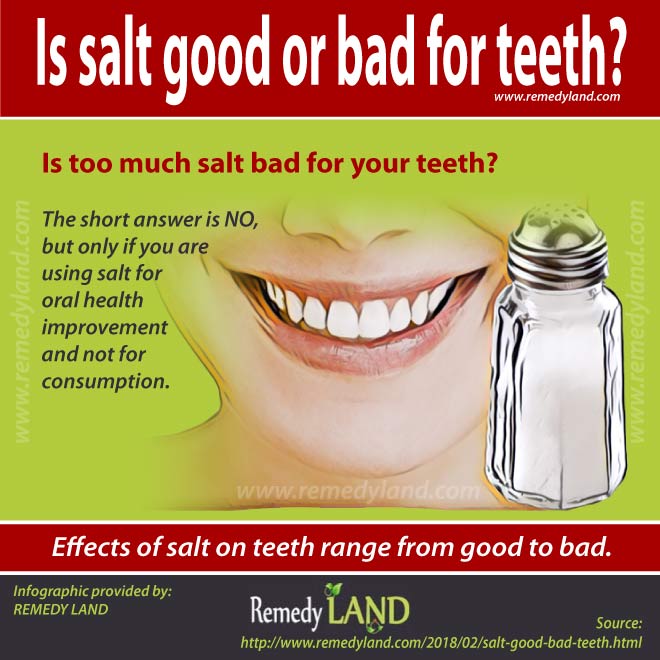Table salt, or sodium chloride, can be good and bad for teeth, it all depends on how you are using it. Effects of salt on teeth range from the good, as an antibacterial mouthwash, to the bad, as an element that can cause tooth decay or tooth erosion. To use all the benefits of salt for teeth, keep reading carefully.
Page Contents
Is salt good for your teeth?
If you want to use salt to enhance your oral health, you are in good luck because salt is a great antibacterial. Since salt is one of the oldest and most used spices in the world, you can easily find it in the kitchen. Those antibacterial properties are quite handy if you need them at home, but they are not substitute for a visit to a dentist.
The sodium chloride chemical mixed with water can be used as a mouthwash and it is actually beneficial, because it will increase the pH balance in your mouth and kill bacteria in hard to reach places. It can be used for densification of swollen gums, teeth, tooth cavities, after tooth extraction or wisdom teeth extraction. Also, salt is going to reduce toothache, help with tooth abscess, tooth infection, mouth infection or wisdom tooth infection. As a common ingredient in toothpaste, salt can be used for brushing teeth and whitening.

Sea salt benefits for teeth
Besides above-mentioned benefits, sea salt is rich source of many trace elements and minerals that can help you with your oral health. Those minerals are going to protect against tartar or halitosis, and can make your gums strong and resilient.
Is too much salt bad for your teeth?
The short answer is NO, but only if you are using salt for oral health improvement and not for consumption. Remember to wash your mouth with a clean water after using salt in any way and for any purpose, because too much salt in your oral cavity is going to create very hostile oral environment and to dry out your mucous membranes. That is not good for many reasons.
When the salt is bad for teeth?
If your oral cavity is dried from salt, you better drink plenty of water to lubricate the soft tissues and gingiva, because if your mouth stays dry, your gums can be injured by eating food and brushing teeth, or your gums may start to recede. Gum recession leads to other problems, because your cementum is revealed, your teeth are more vulnerable and susceptible to decay. Another risk associated with too much salt in mouth is xerostomia, a dry mouth syndrome that can cause gum diseases and tooth decay.
The problem with salt, when it comes to teeth, is not the salt by itself, the problem is the salt as an ingredient of foods. The longer processed salty foods remain in your mouth, the more you are at risk of damaging tooth enamel. Also, consuming to much salt may lead to hypertension, and heaving high blood pressure has an influence on your whole body, including teeth. Anti-hypertensive medications also have effects on the oral environment and can cause xerostomia.
Learn more about salt water and teeth by visiting: Is gargling salt water bad for teeth?

